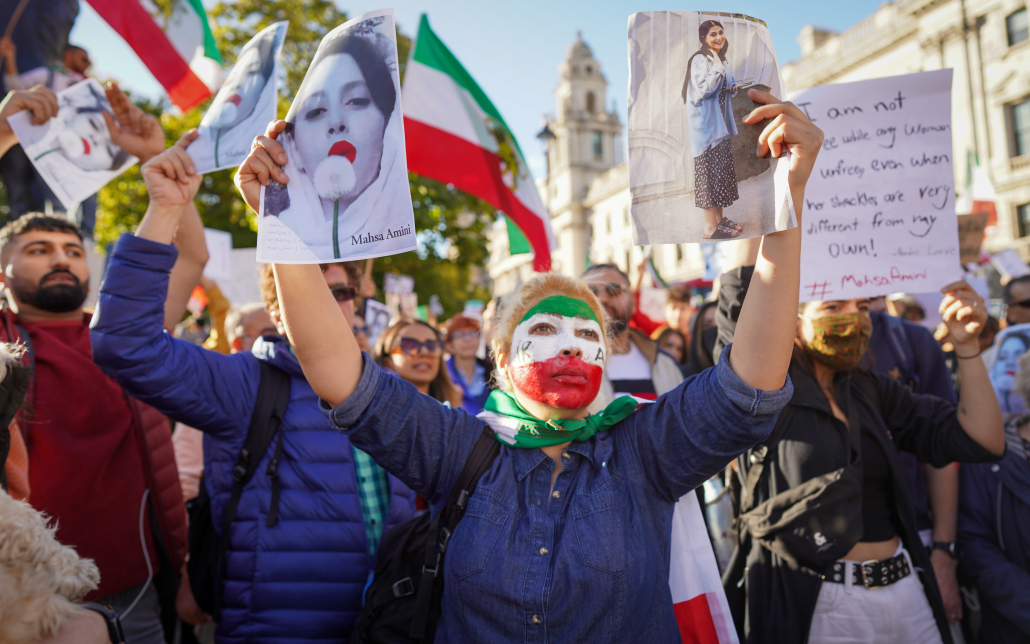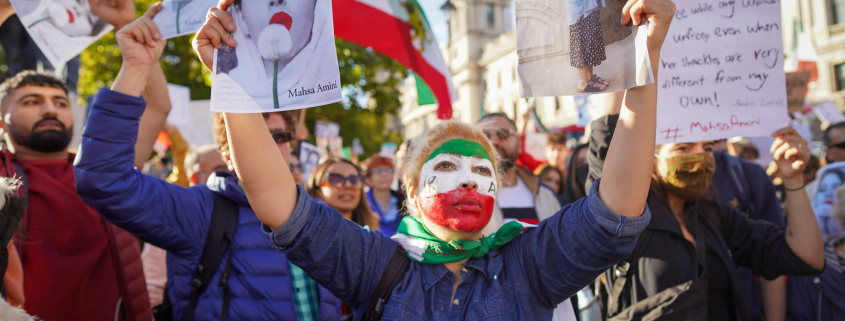The bad and the ugly: Social media puts Iran on blast

On Sept. 13, Mahsa Amini was detained by Iran’s “morality police” who insisted that she was in violation of their compulsory hijab law — a law that requires females who are nine years and older to adequately cover their hair and dress in a covered, modest fashion.
She was pronounced dead in the hospital three days after Iranian authorities alleged that her subsequent coma was caused by a “heart attack.” However, experts from the United Nations reported detailed evidence of her torture and mistreatment by authorities.
Beginning in the aftermath of Iran’s Islamic revolution in 1983, women — regardless of citizenship or religion — were mandated to wear a hijab while in public. Though this law is loosely constructed, specifics in regards to enforcing this rule are up to the discretion of the “morality police.”
As soon as the news broke of the suspicious circumstances of Amini’s death, protests began in multiple cities in Iran, such as Tehran, Ilam and Tabriz — all of which demanded the truth as well as an end to the violence endured by Iranian women at the hands of the government.
After decades of repression, many women have pushed back in an extremely brave, yet costly manner. Young women — as young as school girls — have been at the heart of organizing protests and demonstrations. Videos of school-age girls taking off their hijabs, flipping off photos of the country’s leader and chanting “death to the dictator” have gone viral on Twitter and have garnered nearly 6 million views.
Iran is no longer able to hide the waning tolerance of the morality police and the worsening situation of normalized violence towards women — something that is extremely damaging to their reputation globally. This has become a worldwide embarrassment as numerous countries have condemned the actions of the Iranian government. But simply condemning their actions is not enough. Countless women have been brutally killed and tortured for simply existing — it’s long past the time for action.
On Oct. 3, Canada hit 34 Iranian officials and entities with sanctions and criticized the country for their “blatant disregard for human life.” Italy’s Court of Auditors Magistrates Association — the judges’ association who rarely take a biased stance on political issues — have publicly condemned the response to the protests in Iran as well.
Most recently, the United States announced its newest sanctions which target seven members of Iran’s top leadership after they shut down the country’s internet in order to repress circulation of Amini’s story and diminish the seriousness of the protests. Though this is a terrifying and tumultuous time in Iranian history, this is precisely the warranted response. Citizens are fighting earnestly for their right to personal freedoms — knowing very well that their lives may be the cost. The least other countries can do is stand in solidarity with the women of Iran by hurting the government in a way that hurts — economically.
In the month that has followed since her death, rights groups estimate more than 200 people have died in protest and as many as 14,000 people have been arrested for their involvement. Ironically, the government is currently holding public trials for arrested dissenters, but have continued their impossibly cruel and inexcusable torture regime.
Arman, whose name has been changed for his safety, tells CNN that his life has not been the same after he was arrested in early October for taking part in the protests. He details the brutal ordeal he faced where he was beaten, subjected to electric shocks, drownings and mock executions.
Though this account is jaw-dropping enough on its own, other victims of the Iran Revolutionary Guard Corps shared similar stories and experiences to Arman including rape, threats to their families and post traumatic stress. This however, is not something new to the Iranian government. Informants told CNN that this kind of torture is routine as it goes back to at least 2019 when the government suddenly decided to raise the prices of gas by 50%.
The internet at large can be a deplorable place at times, yet we owe our knowledge of the worsening conditions of day-to-day life in Iran to its existence. Without it, it hurts to think about how much longer this could have gone on without the rest of the world knowing. Though the people of Iran are continuing to suffer on a daily basis and will have to carry the weight of the past in their hearts, the government cannot hide its heinous acts any longer.
In their positions as citizens of an extremely conservative and freedoms-restricted nation, the courage of Iranian nationals — especially female citizens — cannot be overstated. Even though I don’t know what to make of all the most recents events, I sincerely hope that this social media coverage underscores the urgency of the issue in a way that can lead to a proper and swift resolution of the contention that has been building for nearly 40 years.
Despite being over 7,000 miles away from the situation, there is much we can and should do to help turn the tide and end the brutality these women are facing. Use your social media account to spread information on the protests in place for those who have lost access to the internet. Join protests, donate to human rights organizations, write to Congress, keep talking about what is occurring — small individual action can compound on itself to create change only if we all take action. Anything is better than nothing and women like Amini deserve much more than that.

